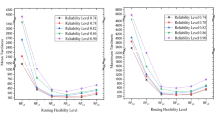Abstract
Stochastic dynamic job shop scheduling problem with consideration of sequence-dependent setup times are among the most difficult classes of scheduling problems. This paper assesses the performance of nine dispatching rules in such shop from makespan, mean flow time, maximum flow time, mean tardiness, maximum tardiness, number of tardy jobs, total setups and mean setup time performance measures viewpoint. A discrete event simulation model of a stochastic dynamic job shop manufacturing system is developed for investigation purpose. Nine dispatching rules identified from literature are incorporated in the simulation model. The simulation experiments are conducted under due date tightness factor of 3, shop utilization percentage of 90% and setup times less than processing times. Results indicate that shortest setup time (SIMSET) rule provides the best performance for mean flow time and number of tardy jobs measures. The job with similar setup and modified earliest due date (JMEDD) rule provides the best performance for makespan, maximum flow time, mean tardiness, maximum tardiness, total setups and mean setup time measures.
Similar content being viewed by others
References
Garey M R, Johnson D S, Sethi R. The complexity of flow shop and job shop scheduling. Mathematics of Operations Research, 1976, 1(2): 117–129
Xiong J, Xing L N, Chen Y W. Robust scheduling for multi-objective flexible job-shop problems with random machine breakdowns. International Journal of Production Economics, 2013, 141(1): 112–126
Allahverdi A, Soroush H M. The significance of reducing setup time/setup costs. European Journal of Operational Research, 2008, 187(3): 978–984
Pinedo M. Scheduling: Theory, Algorithms and Systems. Englewood Cliffs: Prentice-Hall, 1995
Manikas A, Chang Y L. Multi-criteria sequence-dependent job shop scheduling using genetic algorithms. Computers & Industrial Engineering, 2009, 56(1): 179–185
Defersha F M, Chen M Y. Jobshop lot streaming with routing flexibility, sequence-dependent setups, machine release dates and lag time. International Journal of Production Research, 2012, 50(8): 2331–2352
Haupt R. A survey of priority rule-based scheduling. Operations-Research-Spektrum, 1989, 11(1): 3–16
Ramasesh R. Dynamic job shop scheduling: A survey of simulation research. Omega, 1990, 18(1): 43–57
Allahverdi A, Gupta J N D, Aldowaisan T. A review of scheduling research involving setup considerations. Omega, 1999, 27(2): 219–239
Panwalkar S S, Iskander W. A survey of scheduling rules. Operations Research, 1977, 25(1): 45–61
Blackstone J H, Philips D T, Hogg G L. A state-of-the-art survey of dispatching rules for manufacturing job shop operations. International Journal of Production Research, 1982, 20(1): 27–45
Holthaus O, Rajendran C. New dispatching rules for scheduling in a job shop: An experimental study. International Journal of Advanced Manufacturing Technology, 1997, 13(2): 148–153
Jayamohan M S, Rajendran C. New dispatching rules for shop scheduling: A step forward. International Journal of Production Research, 2000, 38(3): 563–586
Jain A, Jain P K, Singh I P. An investigation on the performance of dispatching rules in FMS scheduling. International Journal of Simulation Modeling, 2004, 3(2–3): 49–60
Dominic P D D, Kaliyamoorthy S, Saravana Kumar M. Efficient dispatching rules for dynamic job shop scheduling. International Journal of Advanced Manufacturing Technology, 2004, 24(1–2): 70–75
Wilbrecht J K, Prescott W B. The influence of setup time on job shop performance. Management Science, 1969, 16(4): 274–280
Kim S C, Bobrowski PM. Impact of sequence dependent setup time on job shop scheduling performance. International Journal of Production Research, 1994, 32(7): 1503–1520
Kim S C, Bobrowski P M. Scheduling jobs with uncertain setup times and sequence dependency. Omega, 1997, 25(4): 437–447
Vinod V, Sridharan R. Dynamic job shop scheduling with sequence-dependent setup times: Simulation modelling and analysis. International Journal of Advanced Manufacturing Technology, 2008, 36(3–4): 355–372
Baker C T, Dzielinski B P. Simulation of a simplified job shop. Management Science, 1960, 6(3): 311–323
Yu X, Ram B. Bio-inspired Scheduling for dynamic job shops with flexible routing and sequence dependent setups. International Journal of Production Research, 2006, 44(22): 4793–4813
Rossi A, Dini G. Flexible job shop scheduling with routing flexibility and separable setup times using ant colony optimisation method. Robotics and Computer-integrated Manufacturing, 2007, 23(5): 503–516
Baykasoğlu A, Göçken M, Unutmaz Z D. New approaches to due date assignment in job shops. European Journal of Operational Research, 2008, 187(1): 31–45
Rangsaritratsamee R, Ferrell W G Jr, Kurz M B. Dynamic rescheduling that simultaneously considers efficiency and stability. Computers & Industrial Engineering, 2004, 46(1): 1–15
Van Parunak H. Characterizing the manufacturing scheduling problem. Journal of Manufacturing Systems, 1991, 10(3): 241–259
Baker K R. Sequencing rules and due-date assignments in a job shop. Management Science, 1984, 30(9): 1093–1104
Law A M, Kelton W D. Simulation Modeling and Analysis. New York: McGraw-Hill, 1991
Author information
Authors and Affiliations
Corresponding author
Rights and permissions
About this article
Cite this article
Sharma, P., Jain, A. Analysis of dispatching rules in a stochastic dynamic job shop manufacturing system with sequence-dependent setup times. Front. Mech. Eng. 9, 380–389 (2014). https://doi.org/10.1007/s11465-014-0315-9
Received:
Accepted:
Published:
Issue Date:
DOI: https://doi.org/10.1007/s11465-014-0315-9




